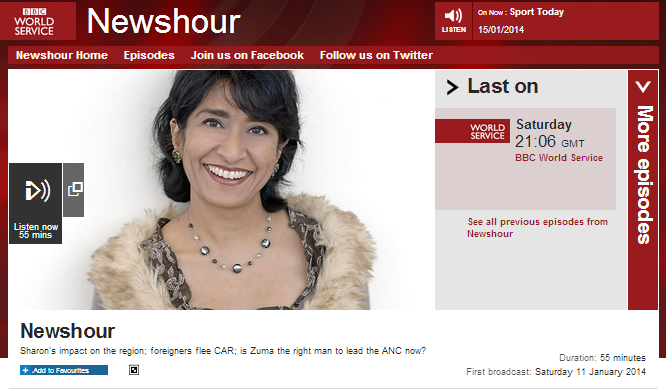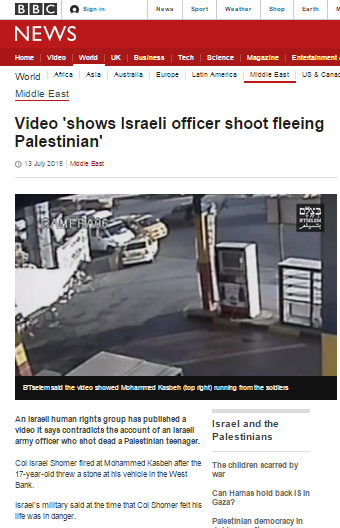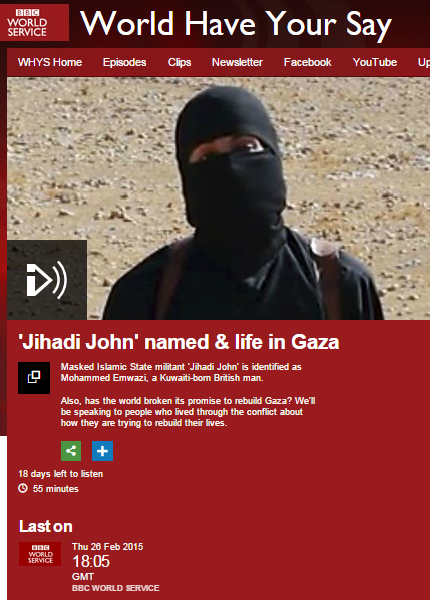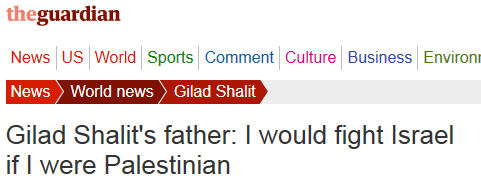The BBC World Service’s flagship international news and current affairs radio programme ‘Newshour’ is broadcast in two daily editions – one at 13:06 GMT and one at 21:06 GMT every day. The January 11th 13:06 edition of that programme, which went on air just an hour after the official announcement of Ariel Sharon’s death, has already been addressed here. The same day’s later 21:06 edition of that programme purported to discuss “Sharon’s impact on the region”.
Again presented by Lyse Doucet, this edition begins with a version of the item by World Affairs correspondent Mike Wooldridge which also opened the previous programme and which repeats the promotion of the myth that the second Intifada began because Ariel Sharon went to visit Temple Mount in September 2000 and once again has the geographically challenged Ahmad Tibi claiming that:
“He [Sharon] came here in order to burn up the area. Al Aqsa Mosque is an Islamic place. Al Aqsa is in the Palestinian territory.”
That is followed by a recording of Shimon Peres talking about Sharon and then one of Hamas spokesman Sami Abu Zuhri saying:
“The death of Sharon after eight years in a coma is a sign from God and a lesson for tyrants. The Palestinian people live in a historic moment due to the departure of this criminal who killed our people and our leaders.”
Next, a section of the defamatory rant by Mustafa Barghouti which was featured heavily in the prior edition of the programme is aired and that is followed by short interviews with former deputy Foreign Minister of Israel Danny Ayalon and Ha’aretz journalist Amir Oren.
At around twenty-five minutes into the programme a news bulletin is read in which the news reader gives audiences what we can understand to be the official ‘in a nutshell’ BBC view of Ariel Sharon and the one it intends millions of listeners worldwide to take away.
“One of the most senior figures from Israel’s founding generation, the former prime minister Ariel Sharon, has died at the age of 85 after eight years in a coma. Mr Sharon played a major and controversial role; first guerilla fighter and soldier known for both bravery and occasional recklessness and later as a politician. When he ordered the invasion of Lebanon in 1982, his Lebanese Christian allies massacred hundreds of Palestinian civilians in the Sabra and Shatila refugee camps. An Israeli commission of inquiry found he bore personal responsibility and he stood down as Defence Minister. His visit to Islam’s holiest mosque in Jerusalem in 2000 sparked Palestinian uprising but Israelis voted him into power the following year. He defied domestic opposition by pulling Israel out of Gaza in 2005 but promoted West Bank settlements and commissioned a barrier to keep Palestinians out of Israel. President Obama said Mr Sharon had dedicated his life to Israel but Palestinians in Gaza celebrated by handing out sweets.” [emphasis added]
And that, ladies and gentlemen, comes from an organization supposedly committed to editorial standards of accuracy and impartiality, so please bear with us as we point out to the BBC World Service that:
1) Ariel Sharon did not ‘order’ the 1982 invasion of Lebanon – the Israeli government did as a result of Palestinian terror attacks on Israeli civilians which the BBC elects to airbrush from the picture.
2) All Lebanese Christian allies were allies of Israel – not of Sharon personally as suggested in this news bulletin.
3) The Kahan Commission found that Sharon and others bore indirect responsibility for failing to anticipate violence on the part of the Phalangists.
4) Sharon’s pre-coordinated visit to Temple Mount – not the Al Aqsa Mosque as erroneously stated – did not spark the second Intifada. That terror war was pre-planned by the Palestinians in advance of his visit, as numerous Palestinian officials have stated over the years.
4) The purpose of the anti-terrorist fence is – as the BBC might better appreciate were it to employ the correct terminology – to curb attacks by terrorists of the kind which resulted in the deaths, maiming and injury of thousands of Israelis before its construction. Its aim is not to keep out “Palestinians”, as is evidenced by the fact that over four million crossings were made by Palestinians in the first half of 2013 alone.
That news bulletin is followed by Doucet misrepresenting the Phalangists as being “under the control” of Sharon: 
“Today Palestinians as well as most Arabs remember Ariel Sharon as an Israeli who, in the words of many, left no good memories. His legacy can be perhaps found most vividly in the memories of those living in the Sabra and Shatila refugee camps in Lebanon. A little more than thirty years ago, the brutal actions of a pro-Israeli militia acting under the control of the then Defence Minister Ariel Sharon have left deep scars. Jim Muir has been to one of the refugee camps today to gauge reaction to his death.” [emphasis added]
In other words, Doucet is telling listeners that the massacres in Sabra and Shatila were perpetrated by a militia which Sharon controlled, with the implication of course being that he also controlled the actions of that militia in the refugee camps.
What follows that is an audio version of a report by Jim Muir, which was also broadcast on BBC television news programmes and featured on the BBC News website. In the filmed version Muir tells audiences:
“It was here in September 1982 that Israel’s Christian militia allies carried out a massacre in these narrow alleys and streets that was to carry the name of Sabra and Shatila – Sabra is just next door – all around the world. The Israelis themselves didn’t come into the camp. They were controlling the perimeter all around and were over beyond there and they basically held the ring as the massacre took place. But, the following year the Kahan Commission report concluded that as Defence Minister, Ariel Sharon was personally responsible for what happened.”
In the audio version broadcast in this ‘Newshour’ programme he says:
“Well this is the Palestinian camp of Shatila on the southern edge of Beirut. It’s a teeming, very densely packed neighbourhood, crowded with little streets and alleyways; very busy, very bustling here now, thirty years on. But back in September 1982 it was a very different story. Christian militia men allied to Israel came in here and perpetrated a massacre of hundreds of defenceless civilians. The Israelis themselves of course were not directly involved. They were controlling the surrounding area and holding the ring as their Christian militia allies went in. The following year the Kahan Commission in Israel concluded that the Defence Minister Ariel Sharon was personally responsible for what happened.” 
Beyond this additional misrepresentation of the findings of the Kahan Commission, Muir is clearly suggesting to audiences that Israel knew what was going on in the camp at the time of the massacre and even collaborating. The British idiom “held the ring” may be unfamiliar to some of Muir’s audience, but its definition is “to oversee a situation while attempting to remain uninvolved in it”.
Muir interviews a ‘man in the Shatila street’ whom he names as Abu Majahed and who very predictably says:
“Well here for everybody Ariel Sharon is the name of the war criminal who is responsible about the tragedy of the Sabra and Shatila massacre and he was the leader of the invasion to Lebanon in 1982. […]
What is make us sad really, we don’t expect that he should die normal or by sickness without any punishment. He should be at the court. Of course they feel that he’s as criminal or as one of the cause of the tragedy for the people and make them lose so many people in the camp during Sabra and Shatila massacre and during the war in general, so his death doesn’t bring sadness to them.”
Following Muir’s report, Doucet speaks to Rami Khouri whom she describes as the Director of the Issam Fares Public Policy Institute at the American University of Beirut and “a syndicated columnist”. Readers can get some idea of American-born Rami G Khouri’s writing from this recent column. Answering Doucet’s request for his “first thoughts”, Khouri says:
“My first thought was that this is a man who spent all of his life in an antagonistic, military, confrontational and violent relationship with all of the Arabs around him – in Palestine, in Lebanon, Jordan, Egypt, Syria. He was constantly at war, killing, occupying, and annexing or laying siege to Arabs or imprisoning tens of thousands of them and in his death his legacy that was the result of his life’s action is perpetuating all of this confrontation, suffering, anger. So this is a very, very negative man in terms of his political actions. The consequences which continue to plague us today because of the settlements, because of the siege of Gaza, the rise of Hamas, the rise of Hizballah, all of the different things that he has done I think will be seen probably much more negative in regional and global terms than any positive way that he is viewed by some Israelis or Zionists.”
Doucet then asks if there should be recognition of Sharon’s pragmatism because of the withdrawal from the Gaza Strip and Khouri continues:
“I think the only thing that we can say about that that would be acknowledging something positive was that you can uproot Israeli settlers, but that was done before: Begin did it in Yamit in the Sinai. But that one symbolic move was, I think, way overshadowed by all of the other negative things that were associated with that, which were a vast expansion of settlement in the West Bank, building the wall, mass imprisonment and laying siege to Gaza. So all he did is redeploy some soldiers on the surface of the ground of Gaza but this led to the wars in consequent years. So I would give him one mark for a positive move to redeploy settlers and get them out of Gaza and I would give him nine negative marks for all the other bad things that were associated with that.”
Doucet asks Khouri if Sharon might also have carried out disengagement in Judea & Samaria had he not been taken ill. His response is as follows:
“I think he might have been thinking about another unilateral disengagement from some parts of the West Bank and he probably would have done what Netanyahu is talking about now: trying to keep the whole Jordan Valley, annex about 20% of the West Bank where the wall runs and maintain control of the underground water resources, maintain control of the air-space above it. So again this is not a serious engagement for peace. This is a unilateral security-minded way to engage with the Palestinians as inferior people who do not have the same rights to statehood and sovereignty and security and human dignity that Jews and Israelis and Zionists do.
This is the problem with Sharon: that he would make these bold, dramatic gestures which would catch the attention of the world and the media and many Israelis, but when you disaggregate his actions and you look at them one by one, they’re essentially colonial in spirit and even, I would say, semi-racist and apartheid-like in their motivation. And this is the real problem with him. He was a man of great complexity, of great drama, but I think also of great criminality at one level because the actions he did – the settlements, the wall, the killings, the siege – were all basically against international law.”
Not a peep is heard from Doucet in response to that polemic. Not even a reminder to listeners that the partial blockade on Gaza came about – almost two years after the disengagement and 18 months after Sharon fell ill – as a result of the increased terror attacks from the Gaza Strip which Khouri of course completely airbrushes from the picture. One actually has to wonder what was the point of having Doucet in the studio at all – other than as scenery for Khouri’s diatribe.
But she is not quite finished yet. After the final guest – former US ambassador to Israel Martin Indyk who gives a very interesting account of his impressions of Sharon – parts of the ‘interview’ with Rami Khouri are rebroadcast.
Not only was no attempt made in this programme to conform to editorial standards of accuracy, but inaccurate information was actively promoted – including in the news bulletin. In addition, whilst listeners heard three positive or neutral opinions (Peres, Ayalon and Indyk), they heard negative or even demonizing ones from a Hamas spokesman, Mustafa Barghouti, Amir Oren, Jim Muir’s interviewee and twice from Rami Khouri, not to mention Doucet herself and Wooldridge. Clearly, as far as editorial guidelines on impartiality are concerned, no genuine attempt to give a balanced view was made.
This programme was broadcast just eight hours after the previous – and no less problematic – edition also presented by Doucet in which the balance was also tipped in favour of negative and even defamatory commentary. It is abundantly clear what the producers and presenter of both programmes were trying to convey to BBC audiences around the world and it is also very obvious that they were not going to let BBC editorial guidelines get in their way.
Related Articles:
Breaches of editorial guidelines in BBC WS ‘Newshour’ special Sharon broadcast





